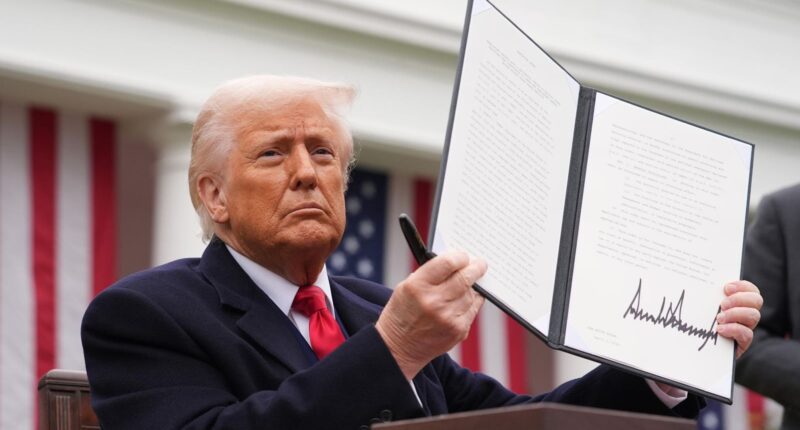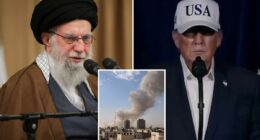Share this @internewscast.com
Topline
President Donald Trump is expected to ask the Supreme Court on Wednesday to decide whether his sweeping “Liberation Day” tariffs are legal, appealing last week’s court ruling against the tariffs and teeing up a resolution to a monthslong legal battle over whether he exceeded his authority—as multiple courts have ruled he did.
President Donald Trump displays a signed executive order imposing tariffs on imported goods on April 2 in Washington, DC.
Getty Images
Key Facts
Trump said at a press conference Tuesday he intends to ask the Supreme Court on Wednesday to hear the tariff case on an expedited basis, which means the court would hear oral arguments and decide the case much more quickly than they normally do.
Trump is appealing a ruling by the Federal Circuit Court of Appeals, which ruled Friday to uphold a lower court ruling against the tariffs and concluded Trump did not have authority under federal law to impose them.
The Trump administration has justified the sweeping “Liberation Day” tariffs under the International Emergency Economic Powers Act (IEEPA), a federal law that gives presidents authority to issue some economic sanctions during national emergencies.
Small businesses and Democratic-led states suing Trump argue IEEPA does not allow Trump to impose tariffs, however—let alone the expansive ones he’s levied on nearly all foreign countries’ imports—and multiple courts have now agreed, with the Court of International Trade and then the Federal Circuit ruling IEEPA doesn’t authorize Trump to wield such broad power on tariffs.
The tariffs are still in effect while the legal battle plays out, as the Federal Circuit put its ruling on pause until either Oct. 14, or until the Supreme Court issues a decision in the case.
Crucial Quote
Trump said Tuesday his administration needed an “early decision” from the Supreme Court on tariffs, claiming it was necessary for “the financial fabric of our country.” “It’s a very important decision and, frankly, if they make the wrong decision, it will be a devastation for our country,” the president claimed about the tariff case.
What To Watch For
Trump has said a petition will be filed with the Supreme Court over tariffs on Wednesday, though it’s still unclear when it could be filed or what it will say. It also remains to be seen how swiftly the court could decide whether to take up the case—and, if it does, how soon a ruling on the tariffs’ legality could come. If the court takes up the dispute, a ruling would come out by the time the court’s term ends in late June 2026 at the latest. Trump is expected to ask the court to decide the issue far more quickly, but it’s unclear if the justices will agree to do so.
Will The Tariffs Stay In Effect While The Supreme Court Hears The Case?
Probably, unless the justices say otherwise. The Federal Circuit said in its order striking down Trump’s tariffs that if the government takes the case to the Supreme Court, the appeals court’s ruling will stay on pause until the court rules. That means the tariffs will stay in effect until the Supreme Court declines to take the case up, or, if justices decide to hear the case, until they issue their final ruling. It’s still possible the businesses and states suing Trump could ask the Supreme Court to overrule the Federal Circuit and block the tariffs while they deliberate on the case, but it’s unclear whether or not justices would agree.
Tangent
The case Trump is set to take to the Supreme Court on Wednesday is one of several lawsuits playing out over the Liberation Day tariffs. Most notably, a different federal court also ruled Trump’s tariffs were likely not allowed under IEEPA, though an appeals court put that decision on hold, keeping the tariffs in effect. The small businesses involved in that lawsuit then took the case to the Supreme Court in June, asking the court to swiftly decide the tariffs’ legality and hear arguments as soon as they could. The justices disagreed and declined to hear the case on an expedited basis, but that doesn’t mean the court won’t now decide to take up the issue quickly in response to Trump’s request.
Key Background
Trump imposed his “Liberation Day” tariffs in April, unveiling the policy after long making tariffs the centerpiece of his economic policy on the campaign trail—despite warnings from economists that doing so would raise prices for consumers and harm the economy. While the status of the tariffs were in a state of uncertainty for months, as the president paused the worst of the tariffs and frequently flip-flopped on the issue, the tariffs finally started taking effect in full force in August, with higher rates rolling out and the government abolishing the “de minimus” exemption that previously allowed lower-cost shipments to avoid customs fees. The litigation against Trump’s “Liberation Day” tariffs has been playing out since April, as small businesses and Democratic-led states almost immediately filed suit after Trump’s initial announcement, alleging the tariffs are devastating to small businesses by substantially raising their costs. The Court of International Trade first struck down the tariffs in May, initially blocking them before an appeals court allowed the fines to stay in effect while the case moved forward. The appeals court then heard arguments in July before issuing its decision Friday.









